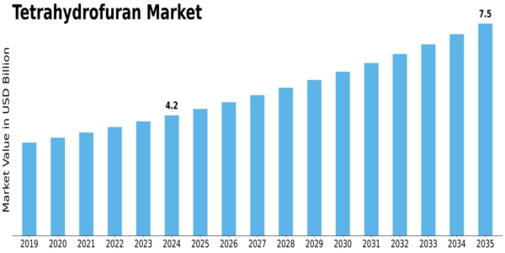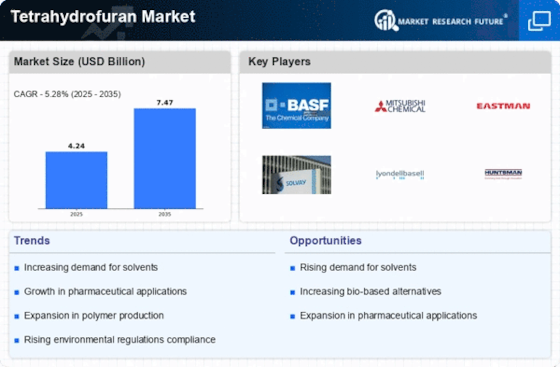Tetrahydrofuran Size
Tetrahydrofuran Market Growth Projections and Opportunities
The Tetrahydrofuran (THF) market is highly competitive, and companies employ various market share positioning strategies to gain a competitive edge. One common approach is differentiation, where companies focus on offering unique features or qualities that distinguish their THF products from competitors. This could include improved purity levels, enhanced production processes, or specialized applications. By differentiating their products, companies aim to capture a specific segment of the market that values these distinctive attributes.
Tetrahydrofuran Market Size was valued at USD 3.8 Billion in 2022. The Tetrahydrofuran industry is projected to grow from USD 4.0 Billion in 2023 to USD 6.4 Billion by 2032, exhibiting a compound annual growth rate (CAGR) of 6.00%
Another key strategy is cost leadership, where companies strive to become the low-cost producers of THF. This involves optimizing production processes, achieving economies of scale, and streamlining supply chain operations. By offering competitive pricing, companies can attract cost-conscious customers and potentially gain a larger market share. However, it's essential to balance cost leadership with maintaining product quality to ensure long-term success.
Market segmentation is also a widely used strategy in the THF market. Companies identify and target specific customer segments based on factors such as industry, geography, or application. This allows companies to tailor their products and marketing efforts to meet the unique needs of each segment. By understanding the diverse requirements of different customer groups, companies can position themselves effectively within specific niches and build a loyal customer base.
Collaborative strategies, such as partnerships and alliances, are becoming increasingly popular in the THF market. Companies often collaborate with suppliers, distributors, or research institutions to strengthen their market position. These partnerships can provide access to new technologies, expanded distribution channels, or a broader customer base. By leveraging the strengths of multiple entities, companies can enhance their competitiveness and capture a larger share of the market.
Innovation plays a crucial role in market share positioning within the THF industry. Companies invest in research and development to create new and improved products, keeping pace with technological advancements and evolving customer demands. Innovative products can attract attention and set a company apart from competitors, fostering customer loyalty and market share growth.
Global expansion is a strategy pursued by many THF manufacturers to increase their market share. As the demand for THF rises in different regions, companies may establish a global presence by entering new markets or expanding existing operations. This not only allows companies to tap into new customer bases but also mitigates risks associated with regional economic fluctuations.
Environmental sustainability is gaining prominence as a market share positioning strategy in the THF industry. With increasing awareness of environmental issues, companies are focusing on producing THF through sustainable and eco-friendly processes. This strategy not only addresses the growing demand for environmentally responsible products but also positions companies as socially responsible entities, appealing to a broader customer base.










Leave a Comment